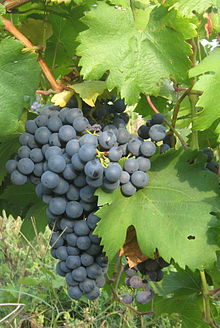Băbească neagră
| Băbească Neagră | |
|---|---|
| Grape (Vitis) | |
 |
|
| Color of berry skin | Noir |
| Species | Vitis vinifera |
| Also called | See list of synonyms |
| Origin | Moldavia region of Romania |
Băbească neagră (also Rară Neagră, and Sereksia) is a red Romanian and Moldovan wine grape variety. It is cultivated in the south of Moldova and in Romania in the regions of Moldavia, Dobruja and Wallachia, making it the second most widely planted grape variety in Romania. It is also found in Ukraine and New York, United States, where the grape is known as Sereksia.
The name Băbească neagră is derived from the Romanian words meaning "grandmother's black". Most wines produced from Băbească Neagră are light-bodied, fruity red wines.
Being an old grape variety, Băbească neagră has demonstrated significant clonal variations including Copceac – a variation with bigger berries, Coada Rândunicii (Swallowtail) - a variation with a bisected bunch and Coada Vulpii (Foxtail) — a variation that has a cylindrical prolongation of the bunch. It has also produced over the years two color mutations including a pink-berried mutation which is called Băbească gri in Romania and Sereksyia rose in Finger Lakes, and a white-berried mutation known as Băbească albă.
Ampelographers believe that Băbească neagră is a very old variety with the earliest mentioning of the grape dating back to the early 14th century. The name, in Romanian, translates to "Grandmother's black" and with the diverse and numerous clonal mutations (including the color mutations of Băbească Gri and Băbească albă) seems to lend support to Băbească neagră's longevity. While the grape is grown through Romania and Moldova, the region most often associated with the being the birthplace of Băbească neagră is the Nicorești region of Galați County in the eastern half of Romania that borders Moldova.
...
Wikipedia
